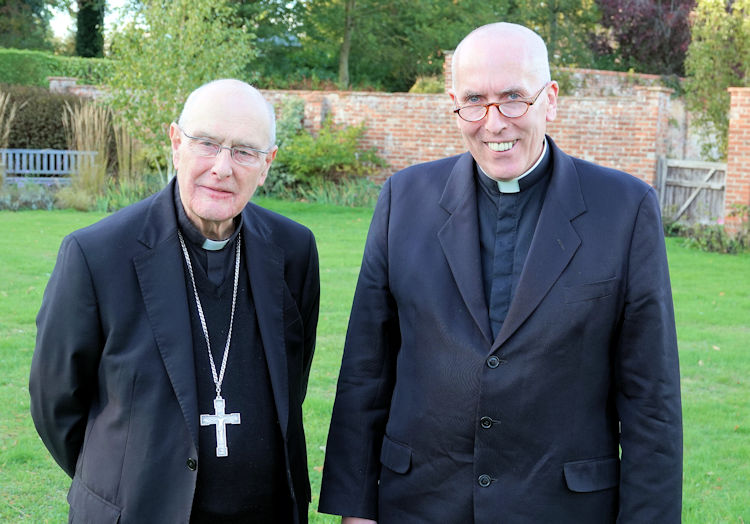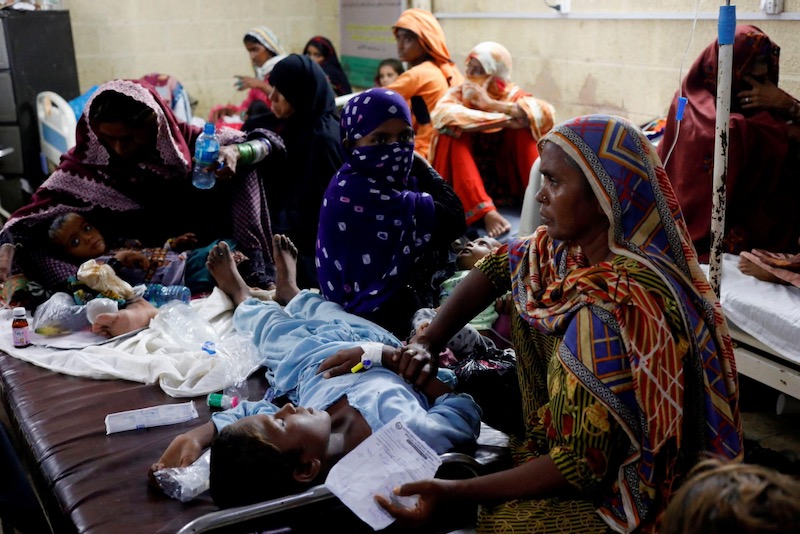Global Sisters Report, an independent source of information about Catholic sisters, is reporting “palpable fear” in Nigeria following persistent attacks on Christians. St Louis Sister Bukola Familade, who was present in Owo on 5 June when an attack on a church killed 41 parishioners, said the violence, "triggered palpable fear in us and has affected our ministries." She reported that, "priests can't go out in their cassocks because they are more targeted by terrorists.” Auxiliary Bishop John Bakeni of Maiduguri said, "there is every attempt to discourage and stop the spread of the Christian faith." He feared the growing persecution of Christians, “has become structural, such as political exclusion and preventing Christians from accessing their rightful education and social amenities.” Fr Aniedi Okure, director of Dominicans for Justice and Peace suggested, "there are criminal elements riding on the security problems in Nigeria today." According to Open Doors, which monitors global persecution of Christians, a Christian is killed for their faith in Nigeria every two hours - roughly 13 Christians a day. "In 2021, more Christians were murdered for their faith in Nigeria than in any other country," the group reported.
After their clash over an interview Koch gave in the German Tagespost, Cardinal Kurt Koch, the President of the Pontifical Council for Promoting Christian Unity and Bishop Georg Bätzing, conference president of the German Bishops’ Conference, met in Rome for a confidential talk on 4 October, writes Christa Pongratz-Lippitt. According to a statement published by the German bishops’ conference they “exchanged positions”. The cardinal had “credibly assured” Bätzing “that he had not meant the German synodal path or its plenary when he compared ongoing theological debates in Germany to the ideology of the so-called ‘German Christians’ during the Nazi Regime”. The Protestant group endorsed Hitler’s ideology and Koch’s reference to the infuriated Bätzing, who demanded he withdraw the remarks. “Nothing could be further from my mind than to insinuate that the members of the German synodal path project shared the ideology of the 1930s”, Koch expressly emphasised, according to the statement. The statement then concludes that after their confidential talk it was “quite clear” to both Koch and Bätzing “that the theological debate … must be continued.”
Missionary groups are highlighting Pakistan’s devastation amidst the worst flooding in the country’s history. Salesians report that close to six million people need urgent help, out of more than 30 million affected, with some living in ad hoc camps with very little food, and no hygiene or sanitation. There are many cases of dengue fever, malaria, diarrhoea, hepatitis and typhoid - alongside a lack of medicines. Columban missionary Fr Liam O’Callaghan, based in Hyderabad, told The Tablet that Pakistan contributes a tiny amount to global emissions, but it is one of the worst-affected countries by climate change.
Archbishop William Lori, chair of the Pro-Life Activities committee of the U.S. bishops’ conference, said the bishops were prepared to support legislation that allowing abortion in certain cases. “Whereas the church always seeks the protection of all unborn children, it is licit to support legislation that falls short of this goal, if it advances protections and limits harm,” Lori said. He also called for more support for pregnant women, saying, “In the post-Roe world, we must act in radical solidarity with the pregnant woman and her child, as we work and pray for the day when abortion is unthinkable.” The archbishop’s 4 October statement marked 100 days since the US Supreme Court overturned Roe v. Wade.
Zambia’s Catholic bishops in a statement issued at the end of last month by the Bishops’ Conference Secretary General, Fr Francis Mukosa, pointed out that homosexual acts are contrary to natural law and under no circumstances can be approved. However, the Church is called to provide appropriate assistance and accompaniment to all her erring children, including those with homosexual tendencies, they said.
Lebanese Cardinal Bechara Rai has denounced the launching of “boats of death” from Lebanon following the drowning of nearly 100 migrants fleeing the country last month. The boat – packed with Syrians, Lebanese and Palestinians – sank on 22 September in the Mediterranean. “Where are the deterrent security measures taken by the state to prevent the boats of death from launching?” he Maronite patriarch asked.
Khandwa diocese in Madhya Pradesh India was forced to cancel a convention of several hundred Catholic youth in early October after Hindu nationalists accused the Church of trying to convert tribal people. Fr Jayan Alex, a diocesan representative, reported that “as our young people – all Catholic - started to arrive in vehicles at a school from different parts of the diocese, a group blocked their vehicle and called the police, alleging that the youths were being brought there for religious conversion.”
Hundreds of Catholics joined a “Love of Life” marathon on 3 October, aiming to address loneliness and a high suicide rate as South Koreans continue to suffer from a rise in social isolation. The run drew 1,200 people from 37 parishes at Mirinae Catholic shrine in Gyeonggi province. Auxiliary Bishop Linus Seong-hyo Lee of Suwon celebrated a concluding Mass.
The Catholic Church in Tigray, Ethiopia’s northernmost state, has called for a peaceful solution to the country’s two-year civil war. A five-month fragile ceasefire ended in August and humanitarian aid is largely blocked. After a military drone attacked internally displaced people in Adi Daero, western Tigray, on 4 October, Bishop Tesfaselassie Medhin, of the Catholic Eparchy of Adigrat, reported that, “the resumed all-round attacks with drones and warplanes, massive indiscriminate artillery shelling in crowded places, urban and semi-urban centres, market places, health education facilities, are destroying the lives of innocent civilians who have lost all means of coping with this monstrous terrorism.”
The leader of Opus Dei Mgr Fernando Ocáriz announced on 6 October that he will convene a special meeting in early 2023 to revise the group’s statutes in order to comply with papal mandates. Pope Francis decreed in July that from now on, the head of Opus Dei will be a priest rather than a bishop. He said the purpose of the mandates is to protect the group’s founding vision.
Abdirahman Abdishakur Warsame, the presidential envoy for Somalia’s drought response, who is in Europe to raise international awareness of the emergency in Somalia, said Britain used to be a key player in international forums and advocacy, but it has since slipped. Speaking to The Guardian, Abdishakur said it was deeply frustrating that the international community was ignoring the impending famine and failing to meet the longstanding pledge of letting poorer nations access a £87.5bn climate fund. “Millions of children are malnourished, many will die, and we don’t have one penny of that climate fund,” he said. “No one is interested in the climate, in food security. It’s all Ukraine, Ukraine, Ukraine”. Caritas Internationalis said in a 30 September report: “Nearly 7.8 million people in Somalia have been affected by the worst drought experienced by the country in over 40 years … Action must be taken now to stop Somalia falling into widespread famine.”
As Kenya lifted a ban on the open cultivation of genetically modified crops, some Catholic bishops expressed reservations about the technology. At a Cabinet meeting in Nairobi on 3 October the government ended the November 2018 prohibition on open cultivation of the crops and the importation of foods and animal feeds produced through genetically modified organisms. In September, agencies warned that Kenya is facing famine, especially in the northeast. Bishop Wilybard Kitogho Lagho of Malindi told CNS: “The timing is wrong. Why wait to fix an issue when people are most vulnerable? That would be open to manipulation. Once GMO seeds are planted, the farmer must always go to the market to buy the seeds for the next planting season. That does not give the peasant farmer a leeway to compete favorably with the multi-nationals.”
Speaking on Thursday at the Organisation for Security and Co-operation in Europe’s Human Dimension Conference in Warsaw, Mgr Janusz S. Urbanczyk, Permanent Representative of the Holy See to the OSCE, highlighted the “heinous crime” of trafficking in persons, particularly in situations of conflict and humanitarian crises. Noting that women and girls are among the most vulnerable Mgr Urbanczyk said that “the organisation of societies worldwide is still far from reflecting clearly the fact that women possess the same dignity and identical rights as men.” In situations of conflict and humanitarian crises, “criminals subjugate, enslave and traffic people,” he said, pointing to the example of the ongoing war in Ukraine.



 Loading ...
Loading ...